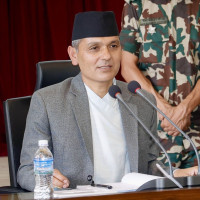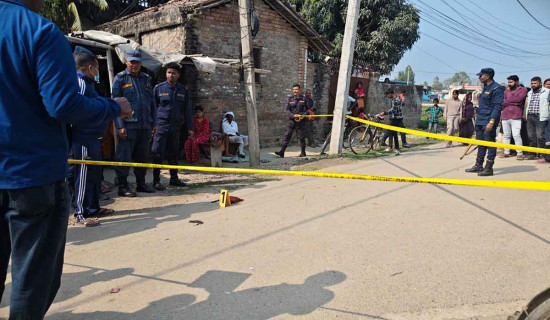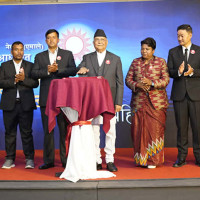- Friday, 20 February 2026
Enduring Power Of Emotion In Politics
Politics in Nepal is driven by passion, emotion and instinct of leaders and people for utility maximisation, not their rational will, achievable vision and value maximisation. Blind passion for politics is so deep that leaders pursue it till their failure or death consumes them. Political debates in Nepal are shaped by strong passions that create a distinction between 'us' and 'them'. Leaders and cadres defend the policies and stance of their own party and leaders, no matter whether they are wise or not and oppose others’ policies with faithlessness even if they hold sensible values. The rational voice of rivals is outrightly questioned, sidelined and even rejected in political decisions and action.
An emotional commitment to one’s own party’s ideals,
ideologies, and leaders’ speeches can make rational attitudes and actions
difficult in public life and the public sphere. Blind passion prevents them
from learning about the crisis unfolding. When leaders and cadres become slaves
of their own passion, they fail to become conscious subjects with the power to
decide the right course for themselves and make wise choices in public affairs.
In such a context, politics turns habit-driven, not innovative. The outcome is:
the scale of power and authority tips toward leaders, not the sovereign people.
One recent example is the protest of Gen-Z against the government's control of
social media, growing corruption and the killing of 19 youth by police. Their
emotive rage against the leaders of mainstream parties has changed the regime
and invited the Nepal Army to protect politicians and shape the formation of the
new rule.
Creative
impulse
Visionary leaders are virtuous and anticipate the consequences
of personal passion. They are trustful of their conscience and reconcile their
passion with creative impulse without falling into the trap of dangerous
extremism of evil desire, which is disjointed from the democratic politics of
toleration and moderation. Total renunciation of passion leads to the virtue of
a secluded hermit accountable to a self-defined universe and seizing universal
feeling in self, not political leadership accountable to the situation of
society and making the life of people better through the use of rational
faculties. Hermits possess the idealistic misreading of politics governed by
human nature, rooted in a self-interest calculus. In this sense, passion with
the vision of a good spirit enables Nepali leaders to balance with public good.
It is the basis of society, polity and the state.
Nepali leaders and people have to set the scales
between mind, spirit and passion in Platonic balance so that they do not spur a
bent to enslave others or isolate them through a politics of negation. The role
of socially conscious intellectuals, civil society and media lies in keeping
the passion of Nepali leaders and irrationality of politics in check by the
liberal spirit of the constitution and moral laws. Passion is the idiom of
universal political life, not just in Nepal. Its emotional ties with political
parties and leaders form a frame of solidarity transcending primordial
considerations and an attachment to modern institutions. It nourishes self-discipline
and moving energy, which is the basis of governance effectiveness.
But the
purpose of politics collides with the passion of leadership for limitless power,
leaving public and national interests to the sticks. Democratic leadership
seeks to find a balance between the partisan imperative to win elections and the
moral duty to serve the common good. Civic culture in Nepal can evolve only if
it is freed from parochialism in the cognition, attitude and orientations of
leaders. The hold of undue partisan instinct loses the public purpose of power
to uplift the life of the wretched.
Similarly, a sadistic attitude to counter
alternative leadership can generate a feuding, other–sacrificing and mutually
blaming culture which loathes the business of politics. In this situation,
politics cannot widen the circle of affinity and improve inter-party democratic
culture. As a result of skewed opportunity, Nepal’s dynamic youth force,
students, workers, educated and business persons, are lured by the global labour
market with the flow of tears welling up in their eyes and disconnecting from
their legendary bonds with the motherland. The swelling costs of politics in
Nepal for the people to shoulder and subsidise have ruffled their emotions,
stoked by electoral and constitutional promises. It has crossed the boundary of
lawful action and bruised the dream of political stability, thus gyrating one crisis
after another.
A series of political movements in the nation
notwithstanding, the outcomes have infused no clear concepts of enlightenment,
modernity and democratic personality of leadership. The party intellectuals, fearful of the loss
of their privilege gained through their nexus, have failed to speak truth to
power and put knowledge and policies to the service of the people and improve
their dignity. Lack of deliberative and listening culture in political parties
has robbed the capacity of cadres to become cogent and rational beings but live
under the pall of fear of disciplinary action for their critical voices, thus
enervating the ardor of constitutional culture.
The unconscious and subconscious mode of people’s
participation generates no stake in the political process, polity and the
state. The fault of Nepali leadership, especially in the realm of political
action, can be alleviated, not by reforming the province of passion only but by
improving their way of thinking and eradicating the corruption of passion,
widening the gap between those seeking livelihood and those seeking grandeur.
Democratisation of private passion of leadership rests on their own political
education, diffusion of democratic knowledge to cadres and people and
cultivation of their character so that they can hone a national perspective and
acquire skills and temper fit for public affairs.
Otherwise, the effects of politicisation of life
continue to be stifled by partisan bias, division and stratification of people
along party lines, unable to forge large-scale collective action for nation
building. Undue partisan ruckus reduces the prospect of democratic
transformation to inclusive turn promised by the Nepali constitution. Nepali leaders of all hues lack collective vision,
imagination and action, which entail shared commitment to a common cause of
democratic wellbeing of people and the spirit of constitutionalism. Here,
it is not just the passion but the rational faculty and spirit that are vital
for democracy.
The Nepali Constitution has maintained “citizenship
through difference,” defined by Constitutional Assembly members rather than by
the people themselves as equal and sovereign co-citizens. Citizenship through
difference glorifies inequality in spite of the constitutional vision of the
creation of an egalitarian society. The mutual dependence of Nepali leaders has
made the change of basic structure difficult. A glut of constitutional rights
has offered great vaults of opportunity but these rights are neither linked to
public policies and laws nor the state resources, a state which is dependent on
debt, imports, aid, knowledge, policies and technologies.
Therefore, realisation of all rights in Nepali
remains a staggering task for leadership and tantalising for people, a promise
problematic to be animated even in the distant future, as they are in the
shadow of leaders’ arrogance. It has given rise to self-centric and personalised
leaders filled with the intense passion for privilege and impunity. Obviously,
politics governed exclusively by the logic of power or scientific reason, to
the exclusion of emotional intelligence, loses enthusiasm and leaves people
without intense attachment to political parties, polity and the state. Its
outcome in Nepal is evident: The rationality of governance is replaced by
reaction, emotion and mobilization of grievances in everyday political
practices.
Its unintended effect is the replacement of morality
by utility and ideology by interests. It is a clear manifestation of human nature,
passion and self-maximisation, which feeds the stomach of individuals but
cannot unchain their souls for freedom rooted in the satisfaction of material
and spiritual needs in common. Likewise, it has reduced ideological
volunteerism and increased the costs of Nepali politics. Management of needs,
demands and expectations of Nepalis can improve the scale of trust in
leadership and shore up its legitimacy.
The feudal passion of leaders’ lordship over people
is yet to be abolished to empower them to overcome their deficits in civic
competence, where they nourish a feeling that their thoughts and actions affect
the direction of Nepali politics. The apparent implications of these deficits
in Nepal are: mistrust, pessimism, populism, radicalism, alienation and silent
migration of young generations of people abroad en masse, thus leaving
politics, economy and society deprived of the catalyst of change agents. Building leadership virtues is essential so
that they can think outside their partisan frame and build national
perspectives through reflective awareness of the human condition.
Civic
culture
Civic culture cannot thrive in a “politics of ends
justifies the means,” where the fairness of the democratic process is
discounted in the political life of the nation and rituals of legalism blind
the rationality of public action. Mutual support of personalised networks by
top leaders without concern for the public good makes social transformation
hard. Albert Camus found difficulty in separating the divides between “crime of
passion” of politics without democratic purpose and “crime of logic” of
adjudicators without reference to justice and morality. Both crimes are
indefensible. They do not aim for efficiency of political action rather suspect
the practice of ages of wisdom. The common love of Nepalis to aham asmi,
existential freedom, is the greatest historical spirit and the founding edifice
of unity in diversity and independence of this ancient nation.
The cognitive openness of leaders to this historical
spirit and variety of national contexts is vital to rejuvenate memories and
atone for the amnesia of guilt and ego-satisfaction. The raison d'être of the Nepali state, where
politics is rooted, is to protect and serve its people and increase their power
for thought and reflection. Yet when its institutional leadership is
distributed among the powerful parties in a partisan manner and they often find
recourse in an irresponsible indulgence, the merits of democracy vanish and the
integrity of governing institutions remains tormented. What Nepal needs now is
the setup of institutional culture and rules to regulate the ties of leadership
and people as per constitutional benchmark and imperative of democratic
politics that reconciles leaders' passion with the expectation of people and a stride
full of forward momentum to universal yug dharma.
(Former Reader at the Department of Political Science, TU, Dahal writes on political and social issues.)















